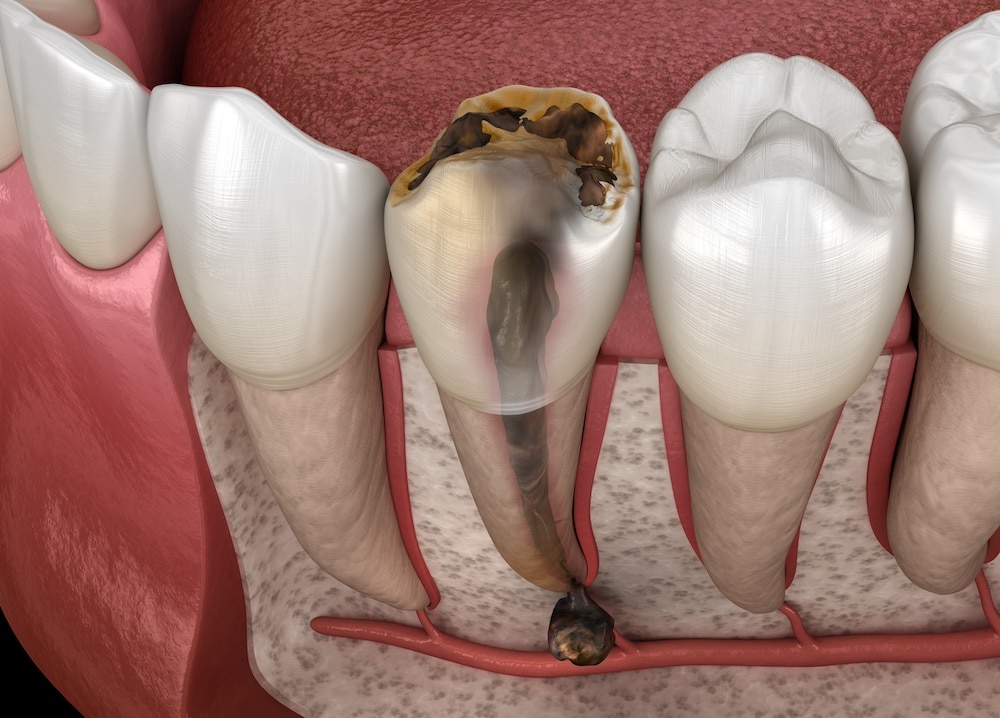Teeth that experience extreme decay or infection are meant to be repaired through root canal operations. On the other hand, issues can occasionally occur and cause the treated tooth to become infected again. It will be easier for you to handle and stay out of this uncomfortable scenario if you are aware of the reasons, treatments, and precautions. What to know if an infection develops in a root canal is as follows.
What Leads to a Root Canal Infection?
When bacteria enter the inner chamber of a tooth that has already received root canal therapy, an infected root canal results. There are various reasons why this could occur:
Inadequate Cleaning: Bacteria left behind from the original operation may proliferate and infect the root canal if it was not fully cleaned or disinfected.
Leakage: Bacteria may be able to infiltrate a treated tooth through a crown or filling that is not tightly sealed.
Cracks or Fractures: A tooth’s interior can become infected with bacteria if it has cracks in it or around a filling.
Complex Root Anatomy: Certain teeth have intricate root systems with small canals that may go unnoticed during first therapy, leaving germs to proliferate and lead to illness.
Treatment of a Root Canal Infections
It’s important that you seek dental care as soon as possible if you think your root canal is infected. What to anticipate throughout the course of treatment is as follows:
Diagnosis: To assess the degree of the infection, your dentist may inspect the tooth and possibly take X-rays. Infection symptoms like pain, swelling, and pus discharge are frequently present.
Antibiotics: Your dentist may recommend antibiotics to treat the infection. These are typically not a long-term fix, although they can aid in lowering the bacterial load.
Re-treatment: Replacing the diseased root canal is often necessary. This entails cracking the tooth open again, extracting the infectious material, cleaning and disinfecting the canals completely, and then sealing the tooth again.
Surgery: Your dentist may suggest an apicoectomy if re-treatment is insufficient. To stop further infection, the surgical technique entails extracting the tooth’s root tip and sealing it.
Extraction: When a tooth is in critical condition and cannot be salvaged, extraction may be required. This is typically the last option, and options for replacing the missing tooth, like a bridge or dental implant, will come next.
Preventing an Infected Root Canal
It’s always preferable to prevent than to cure. The following are some practical methods to aid in avoiding an infected root canal:
Maintain Good Oral Hygiene: To reduce the chance of infection, brush your teeth at least twice a day, floss every day, and use an antibacterial mouthwash.
Frequent Dental Checkups: Schedule routine cleanings and examinations at your dentist. Frequent checkups can assist in identifying possible difficulties early on before they become more significant ones.
Steer clear of Hard Foods: Chewing on hard foods or objects increases the risk of infection by breaking your teeth. To preserve your dental work, watch what you put in your mouth.
Maintain Good Oral Hygiene: To lower the chance of illness, brush your teeth at least twice a day, floss every day, and use an antibacterial mouthwash.
Treat Dental Problems Immediately: See your dentist right away if you suffer from any dental issues, such as tooth discomfort, sensitivity, or damage. Complications can be avoided with early action.
Follow Post-treatment Care Regiment: Your dentist will provide you precise recommendations for after care following a root canal. To guarantee appropriate healing and lower the chance of infection, strictly adhere to them.
In summary
An infected root canal can be a painful and unsettling problem, but it can be successfully treated with timely care and attention. You can keep your smile healthy by being proactive in prevention and being aware of the causes. Do not wait to see your dentist if you think you may have a root canal infection in order to be sure you get the treatment you need.
Experiencing a root canal infection? Smile Vegas offers emergency dental care to ensure you get the best immediate dental care in Vegas. Contact us for an appointment or any questions.


